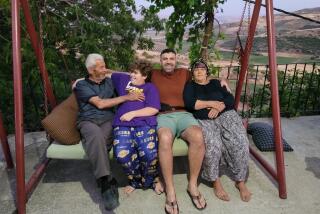One Family’s Fight to Save Its Relatives
- Share via
SEATTLE — War in Bosnia was a long way off for Betty Turulja until the evening news showed her own brother lying in a pool of blood, wounded among a pile of corpses in a Sarajevo bread line.
“That was it,” said Turulja, a Bosnian refugee from an earlier generation. “I got on a plane, determined to bring out my family.”
Her brother is still in Sarajevo, but she brought home her sister, another brother, a niece and a nephew, getting them safely through barrages of bullets and bureaucracy.
Back in Seattle, her husband, Mohammed, got visas for his own nieces and nephews. Together, the Turuljas have brought out 14 Bosnians, all on family reunification visas.
“So many more people are still there, desperate and dying,” Betty Turulja said, stabbing a finger at the tattered list of official phone numbers she calls daily to demand action. “We must stop this war.”
In March, she traveled to the Bosnia-Croatia border, where she befriended a group of Bosnian soldiers who smuggled her sister and two daughters out of Sarajevo.
At the same time, she tracked down her brother, Resad Hadzimesic, 53, who had been imprisoned and tortured. His wife stayed in Zenica with their 3-year-old daughter to care for her blind mother.
Now she wants to return for her other brother, Dzemil, and also Resad’s wife and daughter. “I can’t bear thinking about another winter,” she said. “It is unbelievable that this has to go on.”
Mohammed Turulja, a retired clothier, brought his family to Seattle in 1957. The Nazis had killed his brother, and he said Serbs put 145,000 Bosnian Muslims to death between 1941 and 1945.
He knows there are other sides to the complex situation, but he thinks few Americans are paying attention for fear of seeing modern genocide that might force them to get involved.
“People are saying, ‘Hurry up and finish so we don’t have to watch,’ ” Mohammed Turulja said. “But I think the whole world misjudged the Bosnian nation.”
The Turuljas’ 30-year-old son, Dean, nearly went to Bosnia to fight, but decided to stay home and stir up support for ending the war.
“I’ve seen my parents give everything to this community,” he said. “They’ve taken care of people, sent food and supplies to refugees, raised money with speeches.”
Like his father, he decried what he called a double standard among most Americans who speak about human rights but do little to help. “They don’t want to know,” he said.
More to Read
Sign up for Essential California
The most important California stories and recommendations in your inbox every morning.
You may occasionally receive promotional content from the Los Angeles Times.













